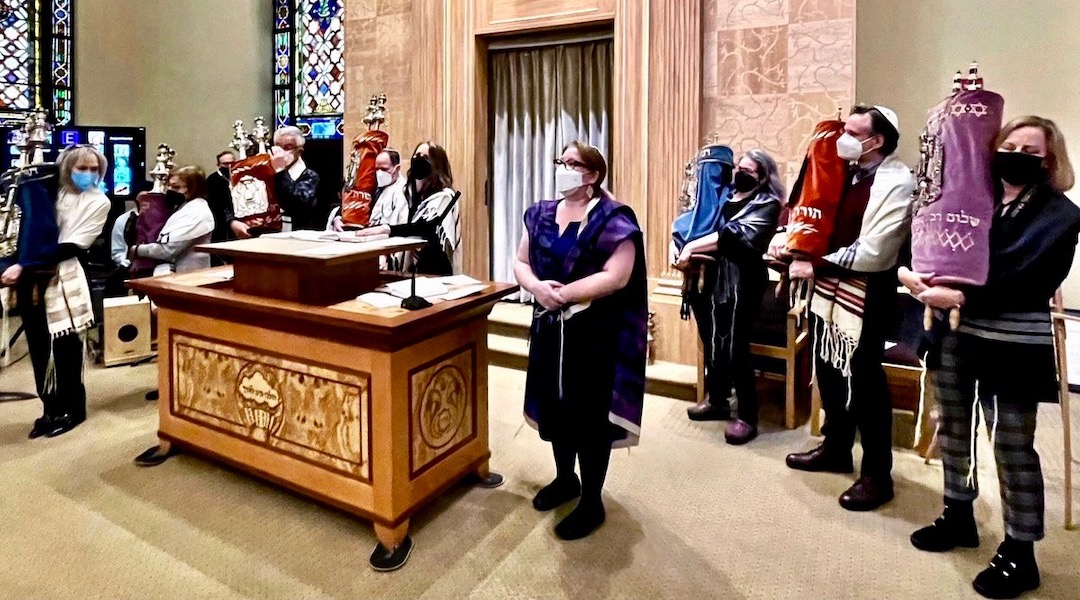(New York Jewish Week via JTA) — New York State’s mask mandate — which required businesses to ask patrons for proof of vaccination or keep masks on all times while indoors — expired on Thursday.
The shift has opened a window of opportunity for local synagogues to revisit their own masking policies, just in time for Shabbat.
Synagogues that had loosened restrictions last fall only to tighten up with the spread of Omicron are again asking how far they can go in keep congregants safe and feeling secure. Many are adopting a wait-and-see approach — especially in keeping mask requirements in place, for now.
In her announcement, Gov. Kathy Hochul emphasized that New York’s counties and cities, as well as individual businesses, can enforce their own mandates. In New York City, for example, the “Key to NYC” program, renewed by Mayor Eric Adams, still requires proof of vaccination for indoor dining, gyms and entertainment.
The New York Jewish Week called several congregations, representing a variety of denominations across the city, to ask what, if any, changes they may be making in advance of Shabbat.
The East Midwood Jewish Center, a Conservative congregation in Midwood, Brooklyn, has decided to maintain an indoor mask policy for all individuals, regardless of their vaccination status, who enter its facilities.
Throughout much of the pandemic, the congregation has held services only on Zoom, even when other synagogues offered hybrid options. EMJC hopes to return to in-person services in the next few weeks, with masks required at all indoor gatherings.
The congregation has multiple venues and programs — including gymnastics, basketball and swimming programs, as well as a robust senior center. The senior center, according to executive director Wayne Rosenfeld, was one of the main reasons that EMJC decided to keep its mask policy.
“We’re trying to get our lives back to normal,” Rosenfeld told The New York Jewish Week. “We’ve been rolling with it ever since the pandemic started. We’re just trying to do what’s right for our community, both for our membership and the community beyond our walls.”
Central Synagogue, a large Reform synagogue in Midtown Manhattan, announced on Feb. 3 that masks and vaccinations are still required, and that Friday night services will be limited to a capacity of 300 members. Children under 5 are not be permitted at services because they cannot be vaccinated. The Saturday Mishkan services — the synagogue’s more participatory, musical service — will be live streamed. The synagogue is still closed to the general public.
Masks will still be required at Park East Synagogue on the Upper East Side. The Modern Orthodox synagogue will also continue to require proof of vaccination to attend in-person services, and on their website they strongly encourage congregants to receive booster vaccinations.
B’nai Jeshurun, an unaffiliated congregation across the park, announced a similar policy on their website on Feb. 3, though they are also capping their services at 100 participants and are specifically requiring KN95, N95 or surgical masks.
In Queens, the Forest Hills Jewish Center will also continue to require masks. “We’re going to see how things go, but as of right now our policy will not change,” said Laurie Worthman, the office manager. The Conservative synagogue also requires proof of vaccination to be submitted before guests attend services in person. Services are also available to livestream on Zoom.
Orthodox synagogues, which have stricter rules than their non-Orthodox counterparts regarding the use of electronic devices on Shabbat and holidays, have not been streaming their services. As a rule, they have been more likely to encourage in-person gatherings, and now to ease mask requirements.
Lincoln Square Synagogue, a Modern Orthodox congregation on the Upper West Side, told congregants Thursday that masks would be now optional for vaccinated individuals, though they invite guests who are still feeling anxious to continue to wear masks. The synagogue is still deciding on their policy for the Youth Department — kids age 12 and under — and ask that for this Shabbat they wear masks.
“We believe that following the State rules are the best way to go. Baruch Hashem [praise God] we were able to open and operate shul safely for more than the last 20 months while strictly following all of the health protocols,” reads an email to congregants from Rabbi Shaul Robinson. “Like many things in life, Covid will remain a challenge for many years to come. But as the situation improves the correct thing to do is to allow Shul life to return to as near normal as possible.”
Another Modern Orthodox congregation, the Riverdale Jewish Center in the Bronx, wrote in their weekly bulletin that they will also be dropping the mask requirement, though they will provide masks for those who wish to continue wearing them.
Congregation Kehilath Jeshurun on the Upper East Side, another Modern Orthodox synagogue, has lifted its mask requirement for vaccinated individuals over the age of 12, and is even hosting a “Grand Shabbat Celebration” this weekend to usher in what they see as a more relaxed stage of the pandemic. This Shabbat will include a “Welcome Back Kiddush” after services for those returning to in-person services.
“We are relieved that the recent omicron surge has receded significantly in our area,” read an email sent to KJ congregants. “As we come up on two years since the start of the pandemic, the absence of community and gathering together have had a noticeable effect on our lives. We need community now more than ever; now is the time to come back to shul on Shabbat.”
The New York Jewish Week brings you the stories behind the headlines, keeping you connected to Jewish life in New York. Help sustain the reporting you trust by donating today.





